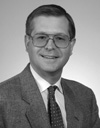Provost's ‘Research Update’ airs growth pains
by Dick PetersonPublic Relations
Research at MUSC has problems, multi-million dollar problems.
Fortunately, they’re the happy kind: how to fairly allocate research space when the Children’s Research Institute and Hollings Cancer Center additions open, who should take possession of vacated space when the chosen few move into their new digs, and how to reward the best grant-getters without alienating worthy projects that might need a money boost to get them to a higher level of productivity.
 At
his town meeting presentation March 13, John Raymond, M.D., touted the
remarkable progress research at MUSC has made in the past 10 years, remarkable
especially with nearly 30 percent state budget cuts, a war looming, and
a suffering economy. And no new research space has come on line in the
past six years, he said.
At
his town meeting presentation March 13, John Raymond, M.D., touted the
remarkable progress research at MUSC has made in the past 10 years, remarkable
especially with nearly 30 percent state budget cuts, a war looming, and
a suffering economy. And no new research space has come on line in the
past six years, he said.
“Our year-to-date funding already is $100 million. Our goal for this year is $140 million and we’re on track for somewhere between $146 and a $150 million,” Raymond said. “This a great indication of the change in direction our university took 15 years ago. We really want to be a major player not only in the region but in the country so that we can have a very credible research enterprise.”
On the way to being a “major player” in biomedical research nationally, MUSC has to deal with the fact that the two major research buildings to come on line in the next year or two are theme-based, leaving little opportunity for growth of programs that are not under the aegis of cancer or children’s research.
“And I intend to remain true to the themes of the two new buildings,” he said. “We need to make sure that anyone looking at the Children’s Research Institute can clearly see that the work there applies to children.” He said that a CRI advisory committee of representatives from the Department of Pediatrics, the College of Medicine and the Office of the Provost will oversee the allocation of space.
Raymond envisions four and a half floors of investigators from different backgrounds, working on different problems, but working toward a common goal of addressing childhood and developmental diseases. “With the synergy, cross-collaboration and common theme they can do so much more than the sum of their individual labors.”
Except to backfill the space vacated by labs moving into the Hollings Cancer Center addition or the Children’s Research Institute, there really isn’t any open used space to move people into as research programs grow, Raymond said.
“We are beginning to plan for a new 100,000 square foot research building now. We need to grow our research at a pace we can sustain.”
Raymond listed “a sampling” of the research space issues facing MUSC:
- Who “owns” research space?
- How should space be assigned?
- What are realistic goals for density of research, and how do we achieve them?
- How can we find space for programs that are not housed in departments?
- How do we promote accountability?
Calling the current space allocation system “feudalistic,” Raymond
explained that while the university owns the space, colleges, departments
and the Hollings Cancer Center administer research space. He questioned
whether the system “is the best we can do,” considering the need for building
and maintaining the infrastructure.
“If the departments own the space, who pays to fix the leak in the roof?” he asked.
Throughout the meeting, Raymond expressed the need for open discussion, full representation for deans, department heads and center directors and faculty, and a competitive system of allocating research space to the most productive and promising projects.
A newly reconstituted University Research Council to advise the provost would provide a forum for problem solving, conflict resolution and research advocacy. It would include broad representation from all the colleges, the Faculty Senate and research support services.
Appointed to chair the council is Michael Zile, M.D., representing the
Faculty Senate, and the vice chair representing the provost, Frank Spinale,
Ph.D., M.D. The council will consist of 20 representatives with each constituent
group having alternate representatives.
Catalyst Online is published weekly, updated as
needed and improved from time to time by the MUSC Office of Public Relations
for the faculty, employees and students of the Medical University of South
Carolina. Catalyst Online editor, Kim Draughn, can be reached at 792-4107
or by email, catalyst@musc.edu. Editorial copy can be submitted to Catalyst
Online and to The Catalyst in print by fax, 792-6723, or by email to petersnd@musc.edu
or catalyst@musc.edu. To place an ad in The Catalyst hardcopy, call Community
Press at 849-1778.